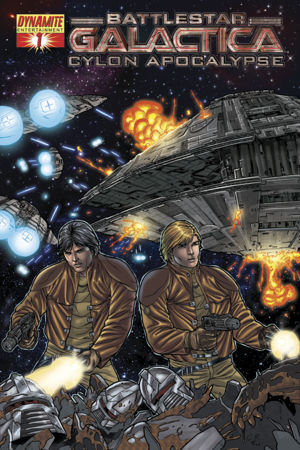List of Comics: Difference between revisions
More actions
→Dynamite Entertainment: These are up to 12 now |
|||
| Line 203: | Line 203: | ||
===Battlestar Galactica: Season Zero=== | ===Battlestar Galactica: Season Zero=== | ||
# ''[[Battlestar Galactica: Season Zero 1]]'' | # ''[[Battlestar Galactica: Season Zero 1]]'' | ||
# ''[[Battlestar Galactica: Season Zero 2]]'' | |||
===Battlestar Galactica: Pegasis=== | ===Battlestar Galactica: Pegasis=== | ||
Revision as of 17:30, 28 September 2007

|
Care to help document every Battlestar comic? Dig up those comics from your basement or bookstore and join other contributors in the Book and Comic Development Project! |
Battlestar Galactica has been adapted into comic book form since it's inception, by a number of different publishers including Marvel Comics, Whitman Comics, Maximum Press, Realm Press, and Dynamite Entertainment. This article provides an overview of the publishing history and links out to individual articles for each series and issue.
- Battlestar Wiki hosts articles on all officially-licensed comics through its separate continuity policy.
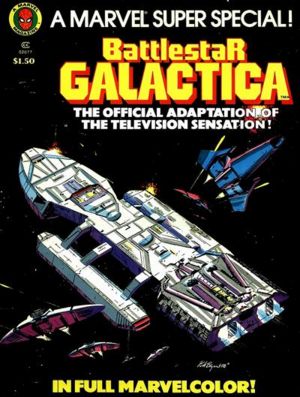
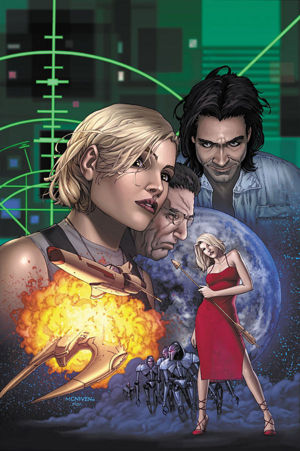
Marvel Comics
Marvel Comics began its adaptation of Galactica with Super Special 8. Super Special was a magazine format comic book that featured different characters or adaptations each month. Issue 8 was produced just in time for the launch of the TV series in September 1978. [[Image:Marvel2.jpg|thumb|right|Marvel Comics Series - Issue 2]] The Super Special adaptation was derived from an interim script of "Saga of a Star World", and some of the differences in the story are evident. This adaptation was also released in a tabloid format by both Marvel Comics and Whitman Comics.
Spurred on by the success of this adaptation, Marvel began a monthly comic series that ran from 1978 through 1980, and lasted a total of 23 issues. The first three issues, titled Battlestar Galactica, Exodus! and Deathtrap! respectively, consisted of a longer adaptation of Saga of a Star World, taking much of the art from the Super Special adaptation and expanding it by several pages.
The adaptation of the series continued in next two issues entitled Into the Void and A Death in the Family, which chronicled the story from the two part television episode "Lost Planet of the Gods".
Beginning with The Memory Machine, Marvel began publishing all new stories based on the characters in the series. From this point, the story began to depart from what was depicted in the series. According to letters pages within the publication, Marvel's contract with Universal Studios specifically did not allow them to use anything from the television series that followed "Lost Planet Of The Gods".
In the storyline that unfolded, a good deal of the comic took place in the magnetic void which the fleet first encountered in the TV episode "Lost Planet of the Gods". In the end of the TV episode, the fleet moves back into normal space, leaving the void behind, but in the comics the rag tag fleet remains in the void beginning in issue #4, with the fleet finally returning to regular space in issue #14. (This makes placing the episodes within the span of the TV series difficult, since much of the action could be surmised to have taken place between "Lost Planet of the Gods" and "Lost Warrior".)
In terms of tone, many of the Marvel comics had horror elements, a theme that was visited sparingly in the TV series. An incomplete list of monsters from the comic series would include a space vampire (issue #9), a carnivorous planet (issue #10), alien vermin (issue #15), a crewmember who transforms into a red ape (issues #17 and #18) and a monstrous shapeshifter (issue #21). Even the menacing and relentless Cylon Mark III in issue #16 owes as much of his origin to horror elements as he does to science fiction. Taken as a whole, Marvel’s Galactica is somewhat darker in tone than the series, but this not-so-subtle paranoia is arguable truer to the initial premise of the series than were some of the latter episodes of the television program.
Notably, the writers of the Galactica comic were quite willing to remove key characters from the dramatic mix for periods of time. From issues #6 to #12, Commander Adama is placed within a machine to help him remember the ancient writings he briefly saw on Kobol and, although we do spend some time in his dreams, he is effectively removed from commanding the Galactica for several issues, which of course sets up its own dramatic tension.
Another character who leaves the series for awhile is Starbuck, as part of perhaps the most effective story arc in the series. In this plotline the fleet stumbles upon Scavenger World, the dominion of the female space pirate Eurayle, who makes a deal to spare the Colonials if she can keep Starbuck at her side. The interactions between Starbuck and Eurayle are memorable, and the conclusion of the storyline, with a tremendous battle in issue #13, is a satisfying conclusion. At the end of the tale, Starbuck remains with Eurayle, and the fleet moves on without him, which of course sets us up for his triumphant return in issues #19 and #20.
Unlike both television series, the Galactica comic actually had a planned ending, with a series of plot devices being wound up in the final two part story of issues #22 and #23. In the course of solving a mystery, Lieutenant Jolly finds adventure and romance and helps in figuring out the long sought coordinates for Earth. A tongue in cheek adventure ably drawn and scripted by Walt Simonson this plotline provided a strong end for a memorable series.
SuperSpecial Adaptation
Marvel Super Special 8: Battlestar Galactica
Marvel Comics Monthly Comic Book
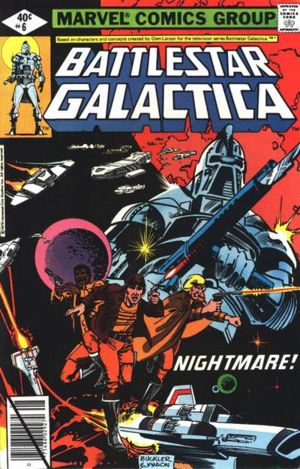
- Battlestar Galactica
- Exodus!
- Deathtrap!
- Into the Void
- A Death in the Family
- The Memory Machine
- All Things Past and Present
- Shuttle Diplomacy!
- Space-Mimic!
- This Planet Hungers
- Scavenge World
- The Trap!
- Collision Course!
- Trial and Error
- Derelict!
- Berzerker
- Ape and Essence
- Forbidden Fruit!
- The Daring Escape of the Space Cowboy
- Hell Hath No Fury!
- A World for the Killing!
- Black is the Color of My True Love's Hair
- The Last Hiding Place
Titan Books Marvel reprints - trade paperbacks
- Saga of a Star World by Roger McKenzie, Ernie Colon and Walt Simonson
- The Memory Machine by Roger McKenzie, Klaus Janson, Walt Simonson and Tom DeFalco
Look-In Magazine
Look-In Magazine, a UK based publication for children, published a serialized comic strip featuring Galactica from October 20, 1979 through October 11, 1980. The four untitled storylines spanned 52 issues, and contained 13 two page chapters per storyline. A very solid composition throughout, this incarnation of the rag tag fleet has been largely overlooked.
- Storyline 1 (issues 1979 #43 to 1980 #3)
- Storyline 2 (issues 1980 #4 to 1980 #16)
- Storyline 3 (issues 1980 #17 to 1980 #29)
- Storyline 4 (issues 1980 #30 to 1980 #42)
Grandreams Annuals
The UK company Grandreams came out with two Battlestar Galactica hardcover annuals, which contained short text and comic book stories. Far inferior to the Look-In strips, these comics were aimed primarily at children.
Maximum Press
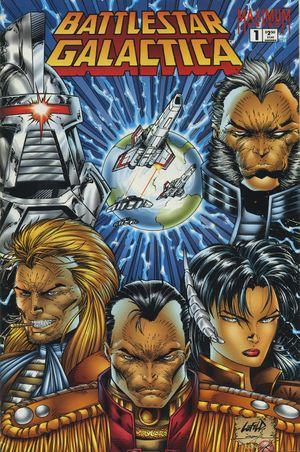
For a very long time, Battlestar Galactica did not appear in comics. Finally, in July of 1995, Maximum Press (a Rob Liefeld imprint) published a miniseries that continued the Galactica mythos, and ignored the storyline from Galactica 1980. This miniseries is also known as the War of Eden.
This series was popular enough that it encouraged Maximum to keep going, and soon more miniseries appeared. Apollo’s Journey, The Enemy Within, and Starbuck all published as three issue series in 1995 through early 1996. Journey’s End, the final four issue series, broke many Galactica conventions. For example, there is a depiction of Galactica traveling back through time back to the destruction of the Colonies. This was not to last, however, and after the publishing of a compendium volume in early 1997, Maximum announced it would cease publishing comics based on Battlestar Galactica.
War of Eden
The Enemy Within
Starbuck
Apollo's Journey
Journey's End
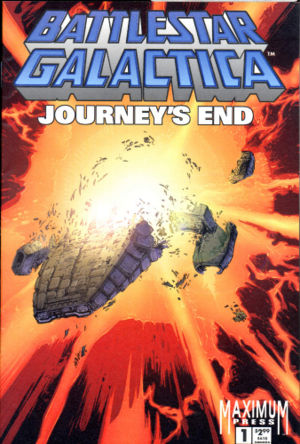
Realm Press
In 1998, Realm Press brought Battlestar Galactica back to comics again beginning with their Battlestar Galactica Search for Sanctuary single issue special. Other one shots were subsequently published. Later, Realm introduced a monthly comic titled Battlestar Galactica Season 3. This series only ran for three issues before it was canceled, and shortly thereafter Realm abandoned the project altogether.
The Realm series was notable for its use of airbrushed art and its attempts to remain faithful to the look and feel of the Original Series.
Battlestar Galactica, Season II
- Issue 1: The Law of Volahd, Part 1 (2 alternate covers)
- Issue 2: The Law of Volahd, Part 2
- Issue 3: Prison of Souls, Part 1 (2 alternate covers)
- Issue 4: Prison of Souls, Part 2
- Issue 5: Prison of Souls, Part 3
Battlestar Galactica, Season III
- Issue 1: No Place Like Home (3 alternate covers)
- Issue 2: Hades Hath No Fury (4 alternate covers)
- Issue 3: Fire in the Sky (3 alternate covers)
Galactica: The New Millennium
- Fear of Flying / Favorite Son / Tales of the Pegasus: Chapter One, Daddy’s Girl (3 alternate covers)
Eve of Destruction
- Prelude I: Nostalgie De La Boue / Prelude II: Daughter of Elysium
Search For Sanctuary
- Search For Sanctuary, Part I
- Search For Sanctuary Special Edition
1999 Tourbook
- Dark Genesis (3 alternate covers)
Special Edition
- Centurion Prime (2 alternate covers)
Gallery Special
- The Care and Feeding of Your Daggit / Masquerade
Cancelled one-shots
- Colonial Technical Journal, Volume 1
- Dire Prophecy (2 alternate covers)
- Darkest Night (2 alternate covers)
- Battlestar Black and White (2 alternate covers)
- Cylon Dawn (2 alternate covers)
- No-Man’s Land (2 alternate covers)
- Minor Difficulties (anthology of short tales)
Dynamite Entertainment
In May 2006, Dynamite began releasing a comic series based on the Re-imagined Series. The comics are set within the framework of the show and, at at first were set between the episodes "Home, Part II" and "Pegasus".
Beginning in late September 2006 Dynamite began releasing an Original Series continuation series.
In October 2006, a miniseries focusing on the Re-imagined Series character Tom Zarek was released, focusing on Zarek's past.
Re-imagined Series issues
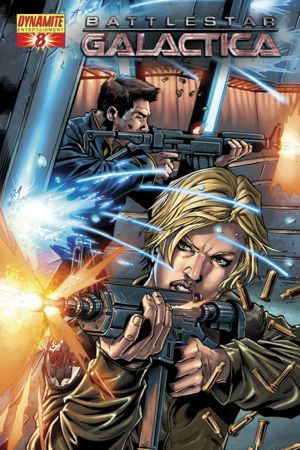
By Grek Pak (writer) and Nigel Raymond (illustrator)
- Battlestar Galactica 0
- Battlestar Galactica 1
- Battlestar Galactica 2
- Battlestar Galactica 3
- Battlestar Galactica 4
- The above five issues have been collected into the hardback graphic novel Battlestar Galactica Volume I (2007)
- Battlestar Galactica 5
- Battlestar Galactica 6
- Battlestar Galactica 7
- Battlestar Galactica 8
- Battlestar Galactica 9
- Battlestar Galactica 10
- Battlestar Galactica 11
- Battlestar Galactica 12
Battlestar Galactica: Zarek series
- Battlestar Galactica: Zarek 1
- Battlestar Galactica: Zarek 2
- Battlestar Galactica: Zarek 3
- Battlestar Galactica: Zarek 4
Battlestar Galactica: Season Zero
Battlestar Galactica: Pegasis
Battlestar Galactica: Origins
Original series issues
- Classic Battlestar Galactica 1
- Classic Battlestar Galactica 2
- Classic Battlestar Galactica 3
- Classic Battlestar Galactica 4
- Classic Battlestar Galactica 5
Battlestar Galactica: Cylon Apocalypse
